Articles
I’m a Sex Worker Asking the 9th Circuit Court to Decriminalize Prostitution
For the first time in thirteen years, the U.S. Ninth Circuit Court of Appeals is revisiting the legality of full service sex work. The case is ESPLERP vs Gascón, in which three sex workers, one client, and the Erotic Service Providers Legal, Educational and Research Project are challenging the state ban on prostitution. I urge this federal court to overturn Penal Code 647(b)because I have lived experience that sex work has improved my life and the lives of others.
Perhaps it comes as no surprise that someone who works in the sex and adult entertainment industries supports decriminalization. For nearly a decade I have made my living in legal sex work, and occasionally dabbled in illegal sex work. The legal: eight stripping years, webcamming, selling undies to collectors, and most recently, selling homemade pornography. The illegal: full service sex work — “prostitution”.
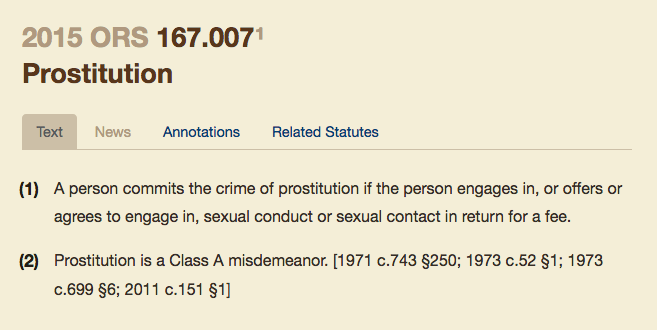
I live in Oregon, where prostitution is defined as a Class A misdemeanor : A person commits the crime of prostitution if the person engages in, or offers or agrees to engage in, sexual conduct or sexual contact in return for a fee.Interestingly, stripping would be illegal by that very definition, because most clubs in Oregon allow “private dances”, where dancers and patrons engage in levels of touch.
But who’s complaining? Not me! Nor the thousands of people who make their livelihood in this regulated and taxed industry. That’s right, Oregon houses about 100 adult entertainment venues (here’s a sample directory from the industry magazine), which typically employ 10–100+ people each. I witness in my community how our legal sexual entertainment industry has improved the quality of life for the vast majority of its workers.
We don’t have to look far back into history to recall what happens in America when you criminalize a vice. Prohibition did not stop people drinking, it just empowered organized crime and corrupt cops. Similarly, our War on Drugs targets already oppressed poor and racial minorities, without reducing the prevalence of crack on the streets or cocaine in night clubs. Keeping sex-for-pay illegal does not erase the natural, healthy biological need we all have for companionship, touch and arousal.
For some, a massage is self care. For others, a massage and a hand job is self care. For still others, a neck rub from a pretty girl while they listen to the Rolling Stones and sip IPA is something they look forward to at the end of a long week. My clients come from many backgrounds, ages and genders. It’s quite a gift for me to nuzzle and play with the hair of the shy forty-something woman, who just this week came out to her family about being gay.

Just existing in my legal sex work job. Photo by MyFridayFilms.
Safe sex work = self care = healing. Just last night I spent time (and earned some money!) with a chain-smoking, balding New Yorker who exclaimed, “Oh my god I love you!” as I pressed my hips against his groin and caressed his jaw in my hands. I laughed, told him that I loved him too, and thank you. It is not unusual for clients and providers to experience such encapsulated intimacy, and yet sex workers also often experience abuse from people who have been raised to view us as lesser. I believe that decriminalizing sex work on every level will propel sex workers into more positive social interactions.
It is common for a customer to come in for a lap dance and ultimately ask if we “do more”, and I wish that I had a brick and mortar to refer these would-be clients to. It goes against my ethics to mix full-service with strip club work, and so I don’t do it. All of my full-service work had to be independently sourced, which is stressful and time consuming, and dangerous. I wish there were more options for people wanting to safely purchase sex or touch, and I wish there were more options for the would-be workers willing to provide this service for payment.
There is no reason to criminalize this aspect of modern human life. Americans pay for all types of services: we pay strangers to raise our children, clean our houses, fix our cars, drill our teeth, take our blood, manage our finances, and the list goes on. Those who argue that “intimate services shouldn’t be commodified” ignore how many intimate services we already pay for — people have hang-ups with sex, and often use such rationalizations to deflect from them:
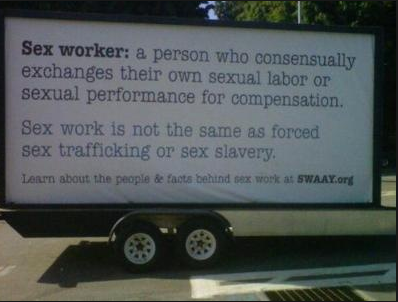
“Sex work” and “sex trafficking” are two different things:
Trafficking is Slavery, requiring coercion. Consent is always the difference, for any type of activity. Can you imagine the difference between getting a tattoo you want, versus one needled into you while you’re held down screaming? How about eating a tasty lunch that you chose, versus being force fed until you puke? Yep, Consent makes all of the difference.
Some people think that the answer is to punish the buyer:
I do not support the Nordic model, because I have experienced firsthand how nervousness or fear in my client leads to irrational behavior. I appreciate that when I strip in a club, I have a safer container for interaction than I would in a stranger’s car in a remote location. I am allowed this safety because my sex work job is legal. And I believe the sex workers who overwhelmingly state that punishing the buyer makes their job more dangerous.
States will save so much money if it decriminalizes prostitution:
One estimate states that between 70,000 and 80,000 people are arrested in America every year for prostitution, costing taxpayers approximately $200 million. One 1982 study estimated that over 30% of then-incarcerated women had been convicted of prostitution. (Orange Is The New Black still hasn’t featured any sex-working characters! Come on Jenji!) The incarceration of so many women is a fantastic waste of money, of resources, and of human life. How many children have been separated from their mothers because mommy engaged in a sex act for an agreed-upon fee?
We should instead focus funds on rescuing people from pimps and traffickers, and punish those who mistreat their providers-prostitutes-people — not arrest people supporting themselves and their families.
Criminalizing full service sex creates more “criminals”:
“Recidivism” is a cute Criminal Justice term that means “the likelihood that a convicted person will re-offend”, and it’s likely that a convicted sex-seller will only find work in that same job after arrest — because people discriminate against women who work sex. My legal sex-working peers have been refused housing, bank accounts, and conventional jobs, and the stigma is worse for women in what is currently illegal sex work.
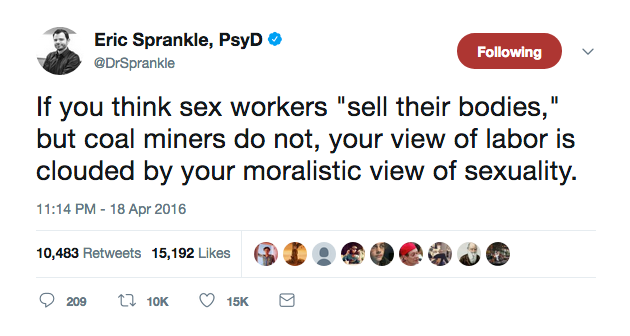
Praise be to good allies.
Don’t decry commodification if you are a capitalist:
I urge people to find a trade that engages their minds and bodies in a beautiful and fulfilling manner. But I’m also a Millennial who has felt the impact of economic recession, and I understand why people engage in work they find stressful, dangerous, physically challenging, or exhausting.
Based on your Facebook statuses, many of you hate your conventional jobs! And yet all people have the basic right to work in the ways that they have determined best suit their needs. Money is a key motivator for me in such a potentially stressful and highly stigmatized industry. If I lived in a bartering or communal society, I’d perhaps engage in a different labor. And yet is that not true for most Americans? Do you have your dream job?
Keep your relationship insecurities out of this human rights fight:
“Sex work ruins families” is another common argument, and if two people have different ideas about how much monogamy they want in their marriage, yes, that can be quite destructive. I do not encourage your husband or wife or girlfriend or son to cheat on their partner by getting a lap dance or buying my porn, just like a beer brewer does not encourage alcoholism. The burger place exists whether or not you are on a diet. Luckily, most of my clients are honest about their desires with their partner, and I have been thanked by many couples for being a marital, arousal, or relationship aid.
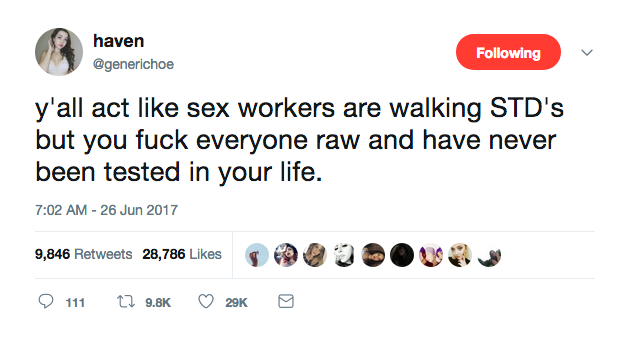
Ignorance about human sexuality is one of the biggest obstacles to overcome if we wish to demonstrate the value of safe sexual sales:
People label us as “dirty” all the time, and warn that decriminalizing prostitution will increase the rate of STIs. I assure you that sex workers who have resources to manage their sexual health will do so, because a professional takes care of their instrument. And decriminalization will allow poorer and less privileged “street workers” to access public sexual health resources without fear of prosecution.
Even more significant; Rhode Island accidentally decriminalized prostitution for a couple decades, and they noticed a measurable decrease in reported rape and female gonorrhea. A 30+% decrease within four years is nothing to sneeze at, and comes to me as no surprise.
And now I complete this open letter, because I must clean my home, shower and feed myself before I drive to my place of work, where I interact sexually and intimately with strangers for money. As my state has deemed legal, and as I find suitable.
Anyway, if San Francisco isn’t the state to decriminalize prostitution, I hope it will happen somewhere else, soon.
To support and connect with Sex Workers and Erotic Service Provider Legal, Educational and Research Project, visit ESLERP.org
Originally published 10/23/2017 on Medium.com





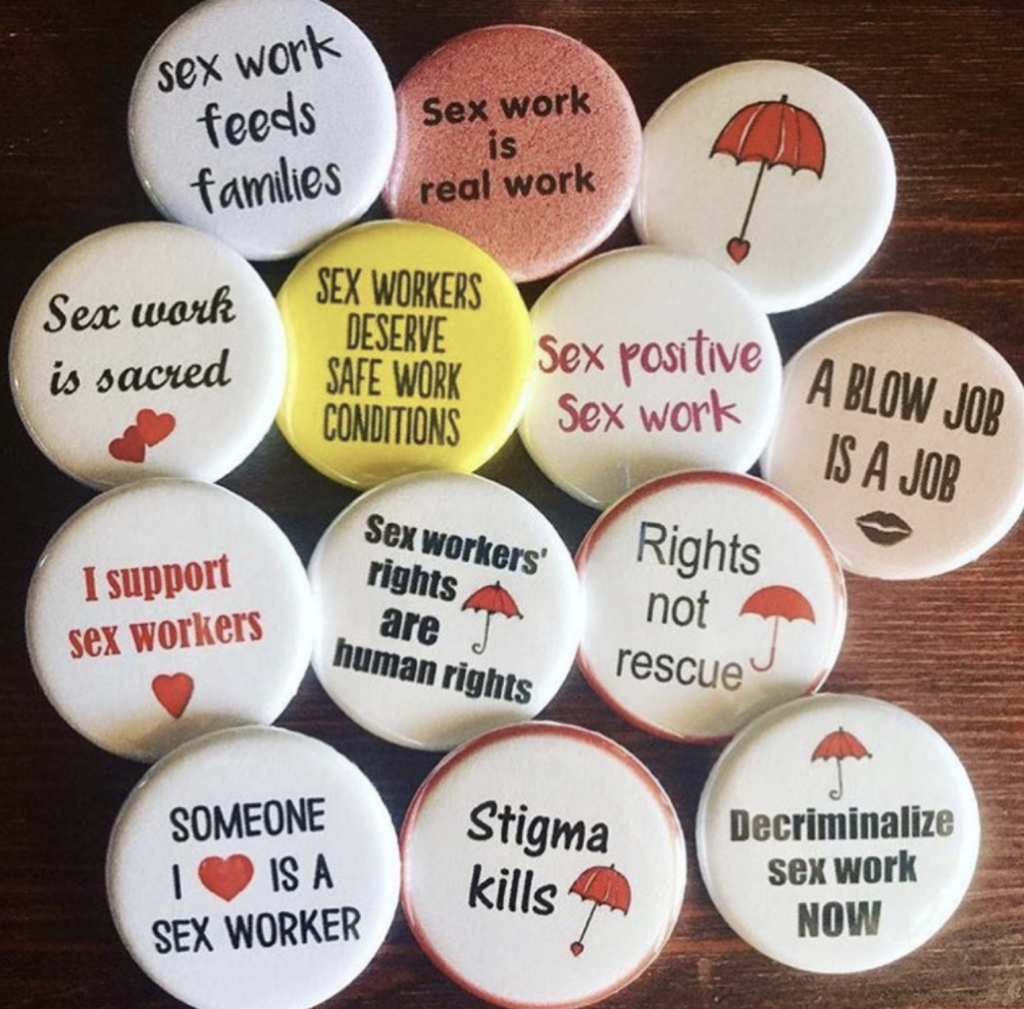



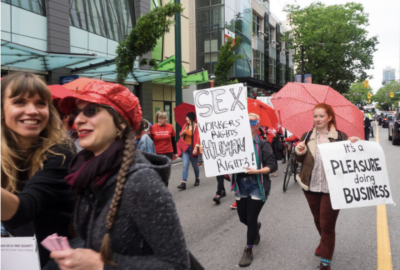













Leave a reply